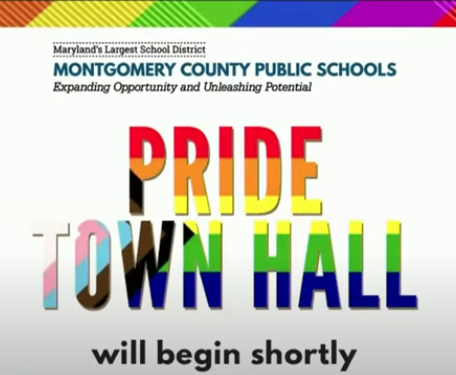Liberal Maryland school system holds second annual ‘Pride Town Hall’

For the second year in a row, the liberal Montgomery County Public Schools system held a virtual “Pride Town Hall” this past spring. This year’s iteration promoted the upcoming fall 2021 semester, in which a pilot LGBTQ social studies course will start in ten of its high schools.
Greg Edmundson, the director of the county’s student welfare and compliance unit, heralded the past year’s achievements when it comes to complying with the LGBTQIA+ agenda. He noted that the school system partnered with Trans Maryland, a transgender rights activist group, to support the school system’s Gay Straight Alliance (GSA) sponsors. As typical with these webinars or meetings, he first listed his preferred gender pronouns of he, him, and his.
Accuracy in Academia reported on the school system’s virtual town hall last spring and how all participants noted their enthusiasm for this year’s pilot LGBTQ social studies course. Based on hundreds of participants’ feedback from last year’s virtual event, Edmundson said that there will be six breakout sessions, in addition to appointing a new county government liaison for LGBTQIA+ issues.
As background, Montgomery County is one of the most liberal and left-leaning counties in the state of Maryland. It has not elected a Republican county executive since 1978, a period of forty-two years. MCPS serves over 160,000 students and has 31 high schools throughout the county.
Edmundson also pointed out that public school employees participated in professional development training on the gender spectrum, which was run by the LGBTQ activist group Gay, Lesbian & Straight Education Network (GLSEN).
Employees, during the past year, took part in a gender health training conducted by the University of Maryland. The school system was a part of a Rainbow Pride conference in the past year, as well. Edmundson affirmed that the school system will continue to work on its compliance training for all of its employees when it comes to LGBTQIA+ issues.
Dr. Amena Johnson, the keynote speaker, works as the county’s new LGBTQ community liaison. Her day job is as the associate director of LGBTQ resources at Georgetown University and her pronouns are she, her, and hers. Her focus was about identity, but she believed that identity is a verb and not solely a noun. She broke down identity into two categories: social and personal.
To her, social identity consisted of “identities attributed to use by our membership in certain groups (collective identity). Examples of social identities are race, gender, sexual orientation, nationality, ability, or class. Johnson claimed, “Those are things that we don’t choose.” It is debatable whether sexual orientation is a choice or ingrained from birth, but Johnson failed to address this issue.
Personal identities, according to Johnson, are “identities that set us apart from others” such as parent, sibling, athlete, musician, profession or hobby. Johnson then quoted Critical Race Theory author Kimberle Crenshaw, “Identity isn’t simply a self-contained unit. It is a relationship between people and history, people and institutions … You can’t change outcomes until you understand how they came about.” There was no mention of Crenshaw’s background or why Crenshaw’s belief in Critical Race Theory is controversial in Johnson’s keynote speech.
She proudly proclaimed that she was the first LGBTQ liaison in the county and commended Democrat County Executive Marc Elrich, saying that he “really had in mind creating a safe place and an affirming place for LGBTQ people” and “it was one of his first priorities.”
Johnson went into her background at length, describing her childhood in Appomattox, Virginia and how it remains a “fairly conservative” and isolated rural area. As a first-generation college student, she was proud to say she got her doctorate and can now be called “Dr. Johnson.” She displayed a photo of her wife at their wedding, and then went into activist mode.
She said that “anti-LGBTQ bias exists in this world” and by telling her story as one who overcame obstacles in her life, it would be a disservice to the LGBTQ community. Johnson claimed that if she shared her story as a story of triumph or success, it would create a façade that there is no racism nor problems in America to overcome.
“Representation matters,” Johnson affirmed multiple times, because “I didn’t see myself in the books” she read as a child or “invisible” identities. “That doesn’t matter” if someone is entering into a non-“identity-based profession,” she said, “Getting someone’s pronouns right is important.” Johnson said it was “especially” important that teachers understand identity as she does, particularly when it comes to framing someone’s identity. Quoting Crenshaw, “Without frames that allow us to see how social problems impact all the members of a targeted group many will fall through the cracks of our movement,” Johnson said that framing identity helps us find the “cracks” in the system.
Johnson also praised the school system for planning to publish “proclamations” for LGBTQ History Month in October and Pride Month in June to “expose the rich histories of LGBTQ people.”
Her steps to frame LGBTQIA+ activism were as follows: “Exposing Truths, Inspire a Culture of Courage, Cultivate a Sense of Hope.” In discussing intersectionality, she said it is important to promote this line of thinking because if the county does not do that, “we’ll continue to uplift privileged identities.” A large part of her role is to “get feedback from MCPS youth” and students, which reflects how the LGBTQIA+ activists focus on children and youth in their indoctrination efforts. The county, Johnson added, has a LGBTQ Advisory Group for those over age 18 and additional resources for activists under age 18.
Unelected government bureaucrats in Montgomery County, Maryland, and in places across the country, are imposing LGBTQIA+ agenda and indoctrination efforts on school-aged children. As this year’s town hall demonstrated, concerned parents have a tough fight ahead of them. But, since it is funded by taxpayer dollars, parents have a right to know the details about these LGBTQ+ efforts.




